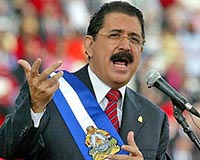 |
Berlin (UPI) Mar 9, 2009 An Ukrainian security expert said Kiev is eager to join European-Russian energy projects such as the Nord Stream pipeline. Ukraine will switch to a more pragmatic foreign policy under its new President Viktor Yanukovych, said Dmitry Vydrin, who helps develop security policies for the president. He added this could include getting involved in Nord Stream -- the European-Russian pipeline project that will link Russia and Germany under the Baltic Sea. The move would be aimed at establishing "greater influence in geo-politics because Nord Stream can't be stopped," Vydrin, once an ally of ousted Prime Minister Yulia Tymoshenko, said Tuesday at a security conference on Ukraine in Berlin. Ukraine is a key energy transit country; most of the Russian natural gas sold to Europe is sent through Ukrainian pipelines. Yet in the past years, constant confrontation between the Orange Revolution leaders and the Kremlin led to several gas price rows that temporarily halted energy flows to Europe, damaging Ukraine's reputation as a reliable transit country. In the aftermath of the first gas conflict, two major Russian-European gas pipeline projects -- Nord Stream in Germany and South Stream in southeastern Europe -- were jump-started in a bid to bypass Ukraine and deliver Russian gas unilaterally to Europe. Nord Stream is the more advanced project of the two. Its pipes are delivered, paperwork has been cleared and construction is due to start within the next weeks. Its ownership structure is highly diversified: State-controlled Russian energy giant Gazprom holds the majority in the Nord Stream consortium with 51 percent, Germany's Wintershall and Eon Ruhrgas own 20 percent each with Dutch Gasunie holding the remaining 9 percent. However, experts say they don't believe that Ukraine has a future within Nord Stream. "I think that's very unrealistic," said Stefan Meister, an energy expert with the German Council on Foreign Relations, or DGAP. "There is no financial capital in Ukraine for such a move nor is there an interest from the current consortium members for Ukraine to join." France's GDF Suez is to become part of the consortium soon, although it's not clear where it will get the shares -- the Germans have been reported to give away 4.5 percent each but they want something in return. Diverting even more shares for a potential Ukrainian entry does not seem realistic at this point. Before Ukraine can play on the same field with Europe and Russia on projects like Nord Stream, it first needs to do its homework -- and that includes investing in the domestic gas grid as well as in roads, ports and airports to boost the Ukrainian economic profile, said Alexander Rahr, another expert with the DGAP. The European Union has offered Ukraine a perspective for a free-trade agreement but, in return, it wants Kiev to reopen negotiations with the International Monetary Fund, increase gas market transparency, privatize state-owned utility Naftogaz and raise gas prices for domestic consumers to boost energy efficiency. These investments are too expensive for Kiev to shoulder alone, experts say. Yanukovych has indicated he might hand the Ukrainian gas network to a consortium of Ukrainian transit companies, Russian state-controlled energy giant Gazprom and Western European utilities to safeguard Ukraine's role as a key transit country. While the consortium issue was not discussed during Yanukovych's visit to Moscow last Friday, it will be once the new Ukrainian coalition is formed, said Russian Energy Minister Sergei Shmatko. Europe and Russia are positive about the idea but in Ukraine not everyone is happy. Tymoshenko, the defeated Orange Revolution hero, blasted the idea as betraying national interests. Establishing a multilateral consortium "means giving away our strategic facility that costs at least $150 billion," she told an Ukrainian TV station.
Share This Article With Planet Earth
Related Links Powering The World in the 21st Century at Energy-Daily.com
 Zelaya's job disguises oil club's woes
Zelaya's job disguises oil club's woesCaracas, Venezuela (UPI) Mar 8, 2009 The arrival of ousted former Honduran President Manuel Zelaya at Petrocaribe energy consortium has deflected attention from the group's financial woes, which require urgent attention, analysts said. Zelaya was appointed the head of a new political council in Petrocaribe, founded by Venezuelan President Hugo Chavez in 2005 and bringing together 18 Caribbean and Central American countries ... read more |
|
| The content herein, unless otherwise known to be public domain, are Copyright 1995-2010 - SpaceDaily. AFP and UPI Wire Stories are copyright Agence France-Presse and United Press International. ESA Portal Reports are copyright European Space Agency. All NASA sourced material is public domain. Additional copyrights may apply in whole or part to other bona fide parties. Advertising does not imply endorsement,agreement or approval of any opinions, statements or information provided by SpaceDaily on any Web page published or hosted by SpaceDaily. Privacy Statement |